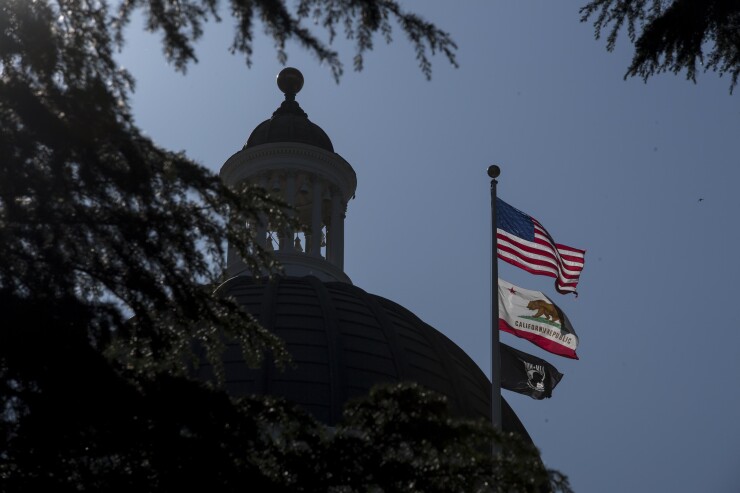Bloomberg News
California’s improved revenue outlook has brought the Golden State an improved rating outlook.
Moody’s Ratings revised the outlook on California’s Aa2 rating to stable from negative Monday afternoon.
Moody’s had revised the
“The state’s fiscal challenges have eased in light of both the implementation of spending adjustments and favorable revenue performance supported by a strong economy,” Moody’s analysts Matt Butler and Henrietta Chang wrote.
The state holds ratings of AA from Fitch Ratings and AA-minus from S&P Global Ratings. Both assign stable outlooks.
Moody’s outlook revision comes after the state’s Legislative Analyst’s Office released
A stock market surge propelled by artificial intelligence company gains set California up for a balanced budget, the LAO said, though it projected outyear deficits hitting $30 billion by 2029.
“State reserves have come down from an unprecedented height, but will likely remain at a satisfactory level as the state moves through fiscal 2025 and into fiscal 2026,” Butler and Chang wrote. “We expect the state will navigate future budget gaps, which are likely, by making sufficient adjustments to revenue and spending so as to maintain a satisfactory financial profile.”
Moody’s affirmed the state’s Aa2 issuer rating, Aa2 general obligation bond rating, the Aa3 rating on the state’s outstanding lease revenue bonds issued by the California State Public Works Board, the Aa3 rating on the state’s outstanding enhanced tobacco settlement bonds issued by the Golden State Tobacco Securitization Corporation, the Aa3 rating on the state’s No Place Like Home bonds issued by the California Health Facilities Financing Authority and the A2 rating on certain revenue bonds issued by the California Municipal Finance Authority for the purposes of financing improvements to regional developmental disability centers within the state.
The Aa2 issuer rating “balances the state’s massive economic base, healthy liquidity, and satisfactory budgetary reserves against a highly volatile revenue structure and limited operating flexibility relative to most states,” Moody’s analysts wrote.
The rating “also considers moderate leverage and fixed costs that are significantly lower than the most heavily burdened states and lower than many Aa-rated peers;” and “reflects an expectation that economic growth in the state will be in line with that of the nation and will support moderate annual growth in revenue,” Moody’s wrote.
The Aa2 GO rating is the same as the issuer rating due to the broad pledge on the bonds, despite a constitutional priority of funding education, Moody’s analysts wrote. The Aa3 rating on the state’s lease debt is notched once off the state’s issuer rating to incorporate the contingent nature of the obligations and the more essential nature of the state facilities financed with the debt, Moody’s wrote.
The state’s lease revenue bonds “benefit from the large inventory of property owned by the state from which a facility could be substituted into a lease,” Moody’s analysts wrote.
The state could receive a ratings boost if accelerated economic growth that generates sustained budgetary surplus and capacity to increase reserves occurs, or if the state experiences reduced exposure to revenue volatility “through, for example, stronger controls on spending or maintenance of budget reserves in excess of 25% of revenue,” Moody’s wrote.
Factors that could lead to a downgrade include a weakened economic and revenue environment that intensifies budgetary pressures; changes in federal policy that carry an increased risk of reduced or delayed funding provided to the state; material growth in the state’s long-term liabilities and fixed cost burdens; continued growth in school district pension contribution burdens; or a general increased likelihood that the state will financially intervene in cases of local government stress.
